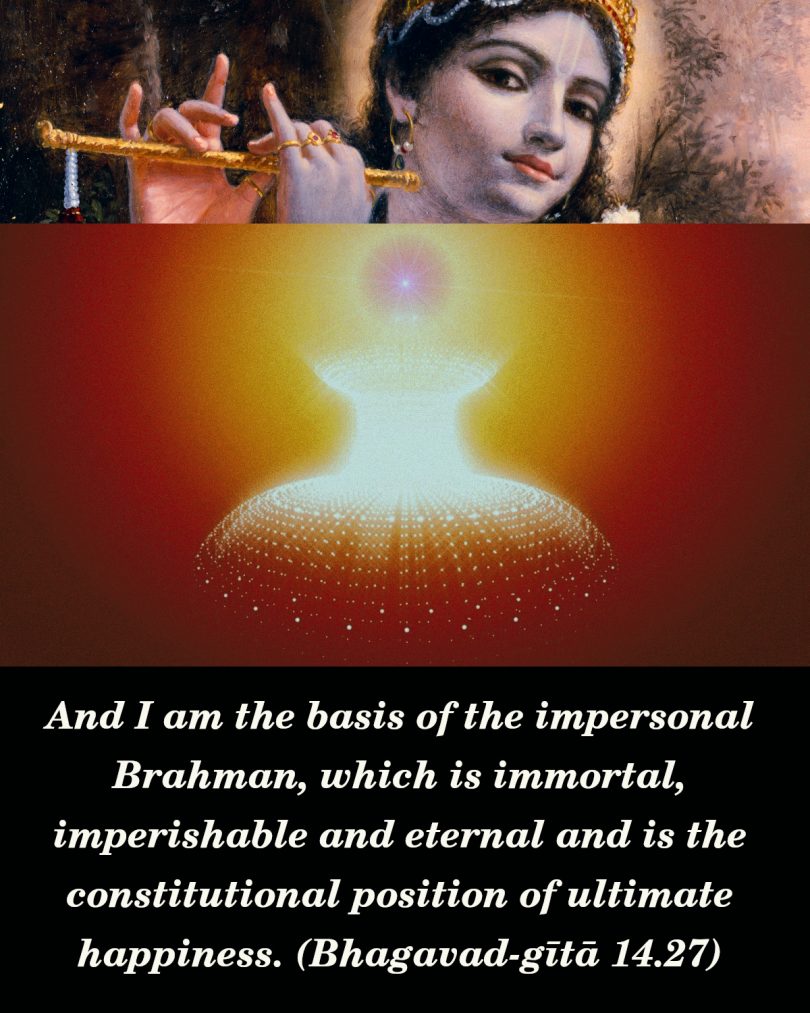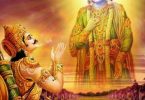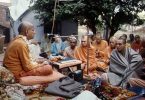Question : Impersonal Brahman as Constitutional Position of Ultimate Happiness?
We were studying the Modes of Material Nature and we had a question on BG14.27: “And I am the basis of the impersonal Brahman, which is immortal, imperishable and eternal and is the constitutional position of ultimate happiness.”
Question 1: Why is Brahman (in this verse it seems clear the the Brahman referred to is the impersonal Brahman) referred to as the constitutional position of ultimate happiness?
Answer by Romapada Swami :
Brahman is pure spiritual existence, quite unlike the inferior material energy. The nature of Brahman is sat (eternal existence) and is transcendental, whereas everything in the material realm is temporary and is colored by the three modes of nature. Krishna is thus making the point that it is only in the Brahman region, beyond the material sky, that one can find transcendental happiness. And He further asserts in this sloka that He is the basis or resting place of that Brahman. The Brahma-jyoti which pervades the entire spiritual sky is in fact the bodily effulgence of Krishna.
Impersonal Brahman is often likened to the rays of the sun. Just as one with no access to the Sun God can at least perceive sunshine, similarly a beginning transcendentalist who has no information of the Personal feature of Absolute sees His shining effulgence as impersonal Brahman.
Question 2: Also from the previous verse, “One who engages in full devotional service, unfailing in all circumstances, at once transcends the modes of material nature and thus comes to the level of Brahman.”, it seems that the discussion is on one who has transcended the modes. So the question is that we read that only unmotivated, uninterrupted devotional service can completely satisfy the soul, and the object of such activity is Krishna – the personal aspect. But how come in this verse the impersonal brahman is stated as the constitutional position of ultimate happiness, especially for one who is on the platform of having transcended the modes of material nature?
Answer by Romapada Swami :
In addition to above answer, you may also want to refer BG 18.54, verse and purport. Attaining the Brahma-bhuta or ‘brahma-bhuyaya’ stage can be thought of as stepping into the threshold of transcendence, beyond the three modes of nature. It is only after attaining this stage that one can actually attain pure devotional service (mad-bhaktim labhate param). As Prabhupada explains in 18.54 purport, in order to serve the Supreme Brahman, one has to be on the platform of Brahman, just as in order to enter fire, one must have a body with the quality of fire.
And yes, only pure devotional service to the Personality of Godhead can completely satisfy the soul and sustain one on the brahma-bhuta stage, and it is both the means and the end. In other words, from the outset it is the most effective process to liberate us to that transcendental stage. But having attained the Brahman stage by whatever means, if one fails to take shelter of the Personality of Godhead, they are sure to fall back into the material pool. (SB 10.2.32)







